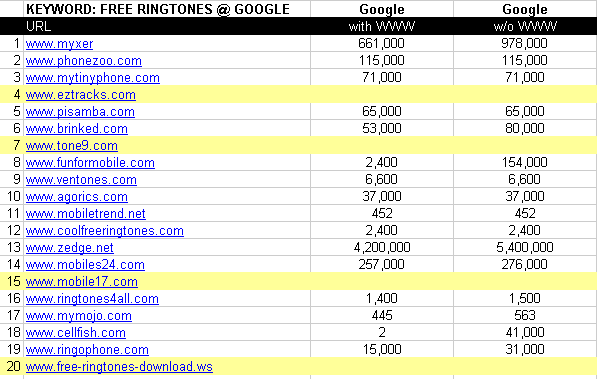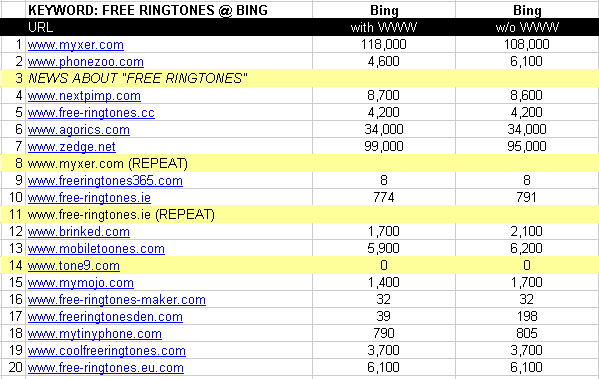Much of what the SEO industry as a whole has proven true (or at least partly true) over time is that content is king. The verdict is still out on the degree that search engines currently rely on manipulate-able elements such as meta tags, page names, even keywords in the URL for the purpose of ranking websites, but what about website size? Does it really matter to rankings?
To find out, let's study one highly competitive search phrase (free ringtones), the top 20 search results on two search engines (Google and Bing), and the number of pages each returns using the site: command (e.g. site:domain.com).
Keep in mind that these results are only from one data center and at one period in time. While it may not be a perfect method, it does provide a relatively accurate representation for our purposes.
What we learned will probably surprise you: the size of the website does not have any direct bearing on how well a website ranks. The term "direct" is very important as there are many other factors included in ranking a site in a competitive position - authoritative links for example. Website size however is important, but not for the reasons you may think. We'll get to that in a minute. For now, let's just take a quick look at the data:


It is not a coincidence that many of the websites you will see at Google and Bing for the particular keyword used (a highly competitive one) have thousands of pages in each engine's respective index. In some cases, these sites have been around for years and had the opportunity to build out their "portfolio" of pages. But as is clear in the chart/graph above, the number of pages (on each engine and for each site) vary wildly, regardless of the position. In fact in certain cases, some sites have ten times as many pages indexed and still don't crack the top three positions (this is more the case for Bing than Google).
This leads us to believe that it's not the size of the website, but rather how you use it ("it" being the opportunities afforded to sites with large content footprints). So how do you use a website with thousands of pages to your advantage? What large websites have going for them in terms of SEO is that they are able to create deep silos of content in a way that will influence rankings for a particular search term.
Developing silos is a process wherein you create containers of related, topical content. To have success with content silos requires that the entire process of optimization start with the creation of an overarching theme and then supporting that theme with adjunct topics, which are then optimized on their own for the primary (and most competitive) keyword phrases. This is not unlike organizing a site by category but silos require that we establish and rigidly maintain that thematic focus to truly excel.
What we are after ultimately is to have each content section support the theme with related topics in its own sub-silo. Using our "free ringtones" keyword for example, we might want to put all of the "rock-and-roll" ringtones in one section and all of the "reggae" ringtones in another. Again, this is not unlike structuring a site appropriately, but where it differs is how we optimize the content within individual silos. Structuring content in this way, and interlinking the pages, help to build authority for the site.
Achieving success with silos requires that we think in advance about page naming conventions, create sitemaps for thematic sub-silos, make sure pages do not have duplicate titles, and most importantly use strong anchor text when linking to supporting pages - those being optimized for the most competitive search terms ( in this case "free ringtones").
Using silos in this way provides us a very structured way to move the ranking needle in our favor.
